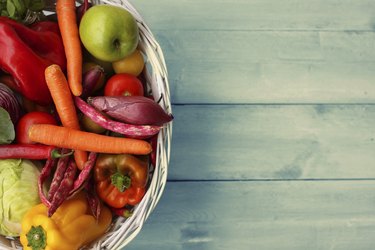
Dietary fiber is the undigested portion of plants that provide bulk to your diet and your stools. Hard, lumpy stools, or stools difficult to pass, are signs of constipation, and a diet high in fiber can help relieve the symptoms of this, either by softening the stools, or by helping the stools pass more quickly through your system. You can also take stool softeners, which help pass the waste along more quickly, as well as softening the stools.
Dietary Fiber Benefits
Video of the Day
Vegetables, whole-grains and fruits are naturally high in dietary fiber, of which the majority of Americans do not eat enough. The recommended dietary intake is 25 to 38 grams of dietary fiber per day. A diet high in fiber can help you feel fuller faster, and, by adding bulk to your diet, can relieve the symptoms of constipation, diverticulosis and diarrhea. A high fiber diet also decreases your chances of cardiovascular disease.
Video of the Day
Soluble and Insoluble Fiber
Soluble fiber is found inside the plant's cell walls, and it mixes with water to create a gel, softening stools. Soluble fiber creates soft bulk to your stools, making them easier to pass. It is also associated with lowering blood cholesterol levels, and may help reduce the risk of heart disease. Insoluble fiber is found in the cell walls of plants, does not mix with fluids, and passes largely undigested through your body. It adds bulk to your stools and encourages the waste to pass through your system more rapidly, helping relieve constipation. The International Foundation for Functional Gastrointestinal Disorders recommends a combination of insoluble and soluble fibers, namely methylcellulose and psyllium, to treat constipation when it is associated with irritable bowel syndrome.
Stool Softeners
Stool softeners taken without medical prescription should be used only on a short term basis, no more than three to five consecutive days. Regular use can create long term damage to your colon. These medications use a combination of sennosides and essential minerals to encourage bowel movements by creating contractions in your gut and encouraging liquid retention in your colon, making stools softer and easier to pass. Stool softeners can come in capsule, tablet, powder or liquid form. Some are available over the counter, although more powerful stool softeners require a doctors prescription.
Taking Both
You can use both stool softeners and dietary fiber to treat constipation, although dietary fiber is recommended as a long term treatment, while stool softeners are not. In cases of severe constipation, use both treatments -- increasing your dietary fiber intake and taking stool softener medication -- as a way of quickly alleviating the symptoms of constipation. For a long term treatment, unless prescribed by a doctor, only a diet high in dietary fiber is recommended, as stool softeners can create damage to your colon muscles if taken too frequently. To increase your dietary fiber consumption, take a supplement or increase the consumption of vegetables, fruits, legumes and whole-grains. If you have trouble digesting some fiber, consider eating lightly cooked vegetables, as cooking can soften the fiber, making it easier on your body.
- Colorado State University: Dietary Fiber
- NYU Langone Medical Center: Bulking Up On Fiber
- MedlinePlus: Soluble vs. Insoluble Fiber
- MedlinePlus: High-Fiber Foods
- University of Kentucky: Vegetable Preparation for the Family
- International Foundation for Functional Gastrointestinal Disorders: IBS Diet -- Dietary Fiber
- MedlinePlus: Stool Softeners